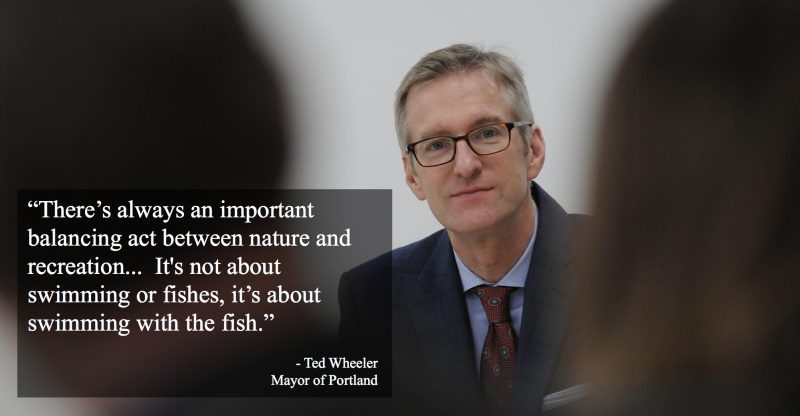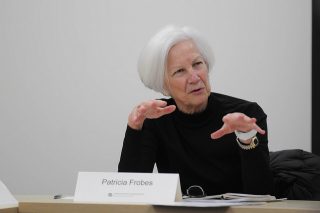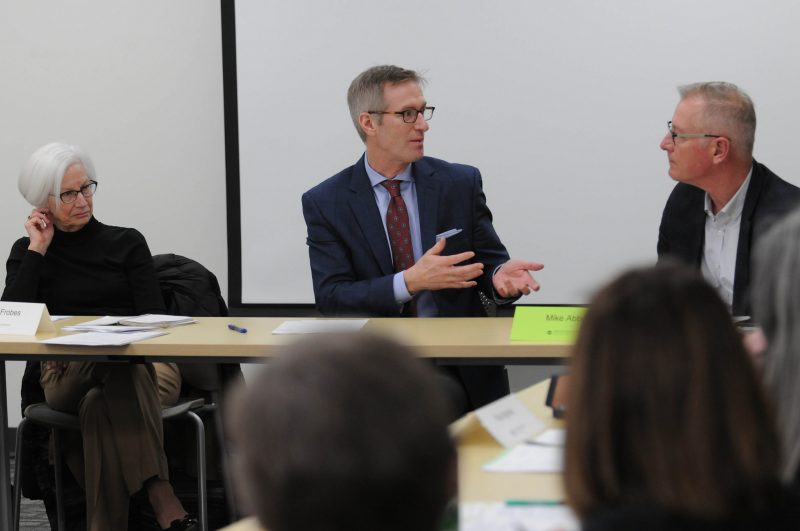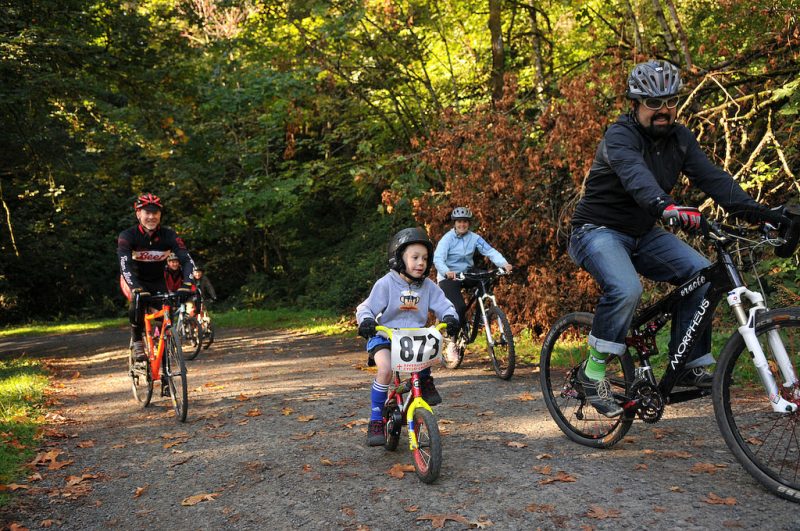
As they prep for its big day at City Council this spring, the Portland Bureau of Planning and Sustainability is in the final stages of their Off-road Cycling Master Plan.
The plan has already been over two years in the making and Portlanders have made nearly 900 individual public comments about what type of trails they want and where new trails should go.
Now comes the politics and last-minute lobbying.
“Mountain biking is a very popular activity, it’s a growing activity.”
— Wheeler
Much of the plan is a no-brainer and has widespread support. But as we’ve reported numerous times over the years, how to improve bicycle access in specific areas like Forest Park (and to a lesser degree, River View Natural Area) has been very contentious. Now all eyes have turned to the 14 member Portland Parks Board as they prepare their recommendation on the plan and get set to host a public hearing on it next month.
Last week the Parks Board hosted Mayor Ted Wheeler and advocates on both sides of this issue listened closely to what he had to say.
Before I get into his remarks, consider the political dynamics at play.
Even though they’re not managing the plan update itself, the Parks bureau is obviously a major voice in the off-road cycling discussion. On February 28th, the Parks Board sent a letter to Mayor Wheeler outlining their top funding and policy priorities for the coming years. Off-road cycling wasn’t mentioned, but that’s not the point. More importantly, the Board has asked Wheeler for $500,000 in the current budget cycle to update their Vision plan. The board also wants him to do more about people living in parks and they want his support for a potential bond measure in 2020.

Parks Board Chair Patricia Frobes opened the meeting by saying Portland Parks are a “crossroads.” “We have a tremendous opportunity with all the growth going on today, but also challenges,” she said. She warned Wheeler that without adequate investment in parks infrastructure, “We will fail to deliver an essential city service to a group of residents that have been historically underserved.”
The Parks Board needs Wheeler on their side. Even in our “weak Mayor” form of government, Wheeler has the power of the pulpit and is the central deal-maker on council (Parks Commissioner Amanda Fritz was also at the meeting). But if he’s going to support them, Wheeler wants to make sure they share his vision — and his prepared remarks at Tuesday’s meeting made that clear.
Advertisement

Flanked by Frobes and Parks Director Mike Abbaté, Wheeler spoke for about nine minutes. His speech centered on the idea that Parks needs to get with the times. “Are we maintaining relevance for youth?” he asked at the outset. “Are we upholding the values that made our park system so beloved over many, many decades? And are we staying relevant to the next generation of park users, while protecting those core values?”
To ilustrate this, Wheeler spoke passionately about his “very intentional focus” on the Willamette River. With the new Poet’s Beach a “success,” Wheeler said his “bigger play” is to make the Willamette River Portland’s “largest open space.” He talked about reconnecting Portlanders to the river and having new access points from every quadrant. “It could be a thriving, engaging, active-use corridor in the heart of our city that brings people together for no cost to them,” instead of what it is now, which he described as, “A divider between east and west, rich and poor, ‘those people’ and ‘those people’.”
Then Wheeler pivoted to the challenge of balancing access to the river with restoration. This is the important part, so I’ll share it verbatim (edited slightly for clarity):
“There’s always an important balancing act between nature and recreation… I’ll steal a slogan I heard once: ‘It’s not about swimming or fishes, it’s about swimming with the fish.’ I thought that was a nice way to sum up the vision [with his approach the river projects]. Now I know that’s different than the vision that has been profferred traditionally in terms of what the Parks Bureau would be engaged with and what the Parks Bureau has planned for and resourced for historically. I get that. But I think it in part reacts to changing demographics, changing needs, and changing demands in our community.
And just because I recognize a lot of people here and know a lot of the people here, I know the same argument takes place around mountain biking. Mountain biking is a very popular activity, it’s a growing activity. Lots of poepole like to mountain bike; but it is not always consistent with the ethos and the attributes and the experience people are looking for in natural areas. So there’s a lot of push-and-pull there. And I thank the people, some of who are in this room who literally spent thousands of hours working on a plan and a strategy on how to balance those interests — which are often melded well together but are sometimes competing interests as well.”
This is a big deal.

Wheeler is sending a signal: If Parks wants support and funding for their projects and major initiatives from City Council, they must respond to the needs of “the next generation of park users.” And if you’ve followed the years of good faith advocacy work by the off-road cycling group Northwest Trail Alliance, you’ll recall their central argument for better access to Forest Park is to create more opportunities for young people who can’t drive to ride off-road trails.
On a broader scale, anyone who has watched Portland struggle to move past voices that cling to the status quo and resist change know exactly where Wheeler is going with all this. Whether it’s fighting for “view corridors” or a historic district designation to prevent new housing from being built, or fighting a street update out of fear about losing parking spaces, Wheeler made his argument about “staying relevant” very clear.
The Parks Board is currently reviewing the Draft Off-road Cycling Master Plan and will take public feedback at their next meeting before making a final recommendation about it later this spring. That meeting is open to the public and will happen on April 3rd at 3:00 p.m. at the Congress Center (1001 SW 5th Avenue, Room 513) Conference Room 7A of the 1900 Bldg (1900 SW 4th).
CORRECTION, 4/4: This article initially misspelled the name of Parks Board Chair Patricia Frobes. I regret the error.
— Jonathan Maus: (503) 706-8804, @jonathan_maus on Twitter and jonathan@bikeportland.org
Never miss a story. Sign-up for the daily BP Headlines email.
BikePortland needs your support.

